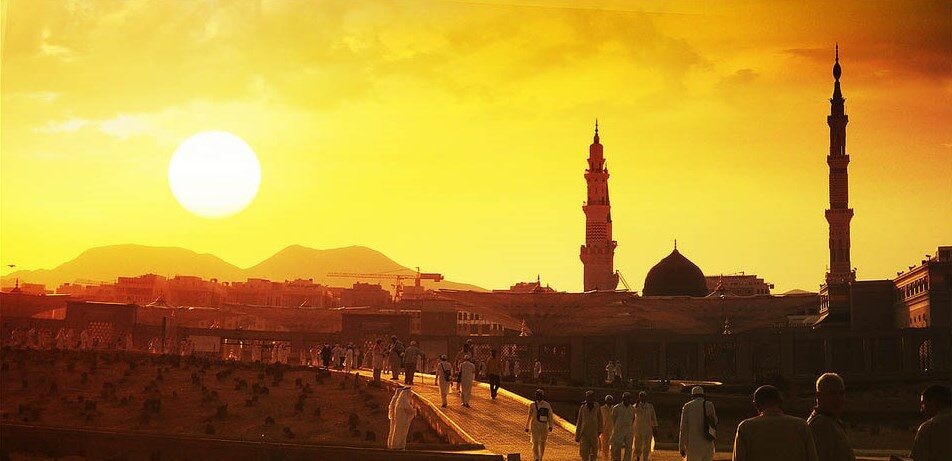Hafiz Yunus Omotayo, Chairman of the Muslim Writers Guild of Nigeria

The auspicious emergence of the crescent of the month of Muharram, which ushered in the New Year 1442 of the Muslim Lunar-Hijra calendar, has graced the horizons of the Muslim world with customary celebratory galore.
Of course, the beginning of the New Year always reminds us of the historic event that took place in 622 AD (1 Hijra) when, on divine guidance, the Holy Prophet Muhammad, peace and blessings of Allah be upon him, embarked on the Hijra (migration) from Mecca to Yathrib (later renamed Medina) along with his companions.
Against the backdrop of the 13-year experiences of victimisation at Mecca, this was a historic base shift from Mecca’s harsh climate of opposition and persecution against Muslims to that of Medina’s relatively conducive environment for the proselytisation and world formation of the divine movement of Islam.
Indeed, the historicity of the Hijra is reflected in the fact that it hallmarked the historical turning-point that began from that very formative stage of Islam and culminated in the fascinating trajectory of the triumphant formation of the Islamic religion and state.
This fact perhaps explains why, during his Caliphate, Hazrat Umar ibn al-Khattab, may Allah be pleased with him, chose the date of the Hijra as the beginning of the Muslim Lunar Calendar, preferring it over the rest of the historical dates of the Holy Prophet’ssa birth or of his commission as a prophet or of his victory over Mecca or of his death.
More relevantly, however, this writer is of the view that the fact that this memorable event was preeminently immortalised as the starting-point of the Muslim Lunar Calendar further implies that it has a continual meaning and message for humanity in the present and the future.
This, therefore, mandates that beyond the usual unorthodox superficial celebration of a New Year, Muslims should engage in a collective sober reflection on, and implementation of, all the positivity which the Hijra represents to our contemporary turbulent time.
A powerful Quranic declaration identifies Hijra as one of the prerequisites that entitles man to divine providence. It says:
“Verily, those who believe and those who emigrate and strive hard in the cause of Allah, it is these who hope for Allah’s mercy; and Allah is Most Forgiving, Merciful.” (Surah al-Baqarah, Ch.2: V.219)
However, the Holy Prophet Muhammadsa gave an impressive twist to the contextual meaning of Hijra that goes beyond its literal translation. He declared, “A true emigrant [muhajir] is he who moves away from all that which God has prohibited.” (Narrated by Abdullah bin Amr bin al-Aas and reported in Sunan Al-Nasai, hadith 4996)
Bearing the foregoing Quranic and Prophetic perspectives of Hijra in mind, this writer finds it compelling to state that with the current multifarious and multidimensional challenges bedeviling today’s Muslim communities in particular and the world in general, it is incumbent on us all to perform Hijra (to migrate) to shift from every non-divine and anti-human paradigm of life, religious practice, politics, intra- and inter-religious, inter-community, inter-ethnic, interracial and international relations, to that of the world-constructive paradigm as enjoined by God and the dictates of universal human values.
Foremost, mainstream Muslim sects and denominations have to collectively resolve to “migrate” from its current state of exclusivist religious worldview and idiosyncrasy – that is breeding extremism, fanaticism, radicalism with their concomitant intra-religious ideological skirmishes and inter-religious terrorism – to an inclusivist, pluralist and multiculturalist paradigm. They must shift base from the paradigm that encourages exclusivist claim to orthodox Islamic truths and the takfir practice (the divisive practice and phenomenon of declaring Muslims as non-Muslims) to the paradigm of inclusivity and the recognition of Muslims’ collective right to the commonwealth of Islam.
Muslims must shift from the paradigm of politicisation of religious issues and the manipulation of religion as a pretext for gaining political and economic power, for causing public disturbance and violence, endangering national and world peace and security. They must collectively adopt a paradigm that fosters mutual respect, understanding, peace and solidarity within a united Muslim world; one which glories under a single leader, a Khalifa.
Furthermore, in a broader application, I would also leverage on the foregoing concept of Hijra to propose that international relations must shift from the current paradigm of the clash of civilisations and world power-play to a paradigm of dialogue of civilisations and collaboration of powers. Interracial relations must “migrate” from the current paradigm of discrimination and injustice to a paradigm of recognition of the commonness of humanity, the mutuality of human brotherhood and justice and equality in human relations.
In the same vein, human inter-ethnic relations must shift from tribalism, nepotism and favouritism to a paradigm of collectivity, meritocracy, equality and equity. Again, governance must “migrate” from the paradigm of corruption and impunity to the paradigm of transparency and accountability. All local and national politics across the world must “migrate” from the paradigm of politics of bitterness and “dirty games” to that of a genuine spirit of selfless service to humanity.
In the same vein, the contemporary economic and financial system must shift from its current interest-based economic and financial paradigm, which fosters continued impoverishment of the poor countries and individuals while the rich continue to be rich, to that of a non-interest-based paradigm.
Most importantly, the contemporary adherents of individual religion must cause the public image of their religion to “migrate” from being a religion of body (materialism) and heart (sentimentalism) to being a religion of mind (rationality), spirit (spirituality) and God (divinity) altogether.

